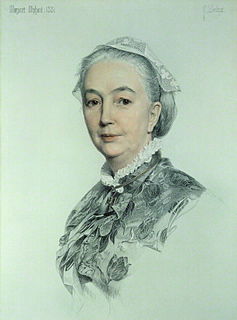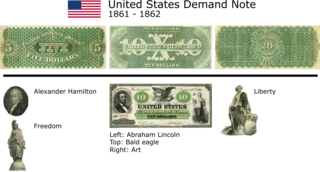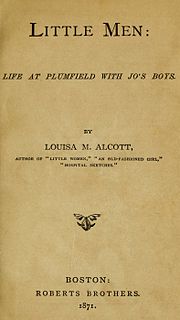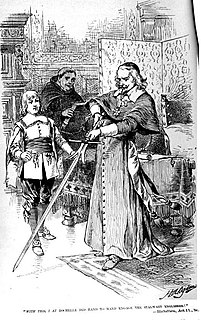
"Almighty dollar" is an idiom often used to satirize obsession with material wealth, or with capitalism in general. The phrase implies that money is a kind of deity.

"Almighty dollar" is an idiom often used to satirize obsession with material wealth, or with capitalism in general. The phrase implies that money is a kind of deity.
Although the phrase "almighty dollar" was not popularized until the 1900s, similar phrases were used much earlier. For example, British writer Ben Jonson wrote in 1616:
Whilst that for which all virtue now is sold,
And almost every vice, almighty gold. [1]
The "dollar" version of the phrase is commonly attributed to Washington Irving, who used it in the story "The Creole Village", which was first published in the 1837 edition of The Magnolia, a literary annual. [2] [note 1]
The almighty dollar, that great object of universal devotion throughout our land, seems to have no genuine devotees in these peculiar villages; and unless some of its missionaries penetrate there, and erect banking houses and other pious shrines, there is no knowing how long the inhabitants may remain in their present state of contented poverty.
Charles Dickens used the phrase in Chapter III, "Boston", of his American Notes , published in 1842.
Edward Bulwer-Lytton is often credited with coining the related phrase "pursuit of the almighty dollar", which he used in his 1871 novel The Coming Race . [3] More obscure uses of the phrase can be found as far back as 1852. [4] [5]
"The Almighty Dollar" is the name of an Ozzy Osbourne song (2007) from the album Black Rain . The song argues that money and greed are destroying the planet by blinding people to problems such as global warming and pollution.
"Almighty Dollar" is the name of a Devin the Dude song from the 2007 album Waitin' to Inhale . It is a lament both of a marijuana user's lack of money and the declining buying power of the U.S. dollar.
The words "Almighty Dollar" are repeated in the 1973 funk hit single "For the Love of Money" by The O'Jays. The song cautions against the intense desire for money and the negative effects such desire can have on a person's personality and actions.
The phrase "Almighty Dollar" is repeated many times in the song "Money (In God We Trust)" by the funk metal band Extreme.

Edward George Earle Lytton Bulwer-Lytton, 1st Baron Lytton, PC was an English writer and politician. He served as a Whig member of Parliament from 1831 to 1841 and a Conservative from 1851 to 1866. He was Secretary of State for the Colonies from June 1858 to June 1859, choosing Richard Clement Moody as founder of British Columbia. He declined the Crown of Greece in 1862 after King Otto abdicated. He was created Baron Lytton of Knebworth in 1866. His marriage to the writer Rosina Bulwer Lytton broke down. Her detention in an insane asylum provoked a public outcry. Bulwer-Lytton's works sold and paid him well. He coined the phrases "the great unwashed", "pursuit of the almighty dollar", "the pen is mightier than the sword", and "dweller on the threshold", and the opening phrase "It was a dark and stormy night." Yet his standing declined and he is little read today. The sardonic Bulwer-Lytton Fiction Contest, held annually since 1982, claims to seek the "opening sentence of the worst of all possible novels".
This article contains information about the literary events and publications of 1839.
This article contains information about the literary events and publications of 1832.
This article contains information about the literary events and publications of 1829.

Bruce Almighty is a 2003 American religious comedy film directed by Tom Shadyac and written by Steve Koren, Mark O'Keefe and Steve Oedekerk. The film stars Jim Carrey as Bruce Nolan, a down-on-his-luck television reporter who complains to God that he is not doing his job correctly and is offered the chance to try being God himself for one week. The film is Shadyac and Carrey's third collaboration, as they had worked together previously on Ace Ventura: Pet Detective in 1994 and Liar Liar in 1997. It co-stars Jennifer Aniston, Philip Baker Hall and Steve Carell.

In music, groove is the sense of an effect ("feel") of changing pattern in a propulsive rhythm or sense of "swing". In jazz, it can be felt as a quality of persistently repeated rhythmic units, created by the interaction of the music played by a band's rhythm section. Groove is a significant feature of popular music, and can be found in many genres, including salsa, rock, soul, funk, and fusion.

Edward Robert Lytton Bulwer-Lytton, 1st Earl of Lytton, was an English statesman, Conservative politician, and poet. He served as Viceroy of India between 1876 and 1880—during his tenure Queen Victoria was proclaimed Empress of India—and as British Ambassador to France from 1887 to 1891.
Allen Walker Read was an American etymologist and lexicographer, best known for his studies into the words "OK" and "fuck."

Margaret Oliphant Wilson Oliphant was a Scottish novelist and historical writer, who usually wrote as Mrs. Oliphant. Her fictional works encompass "domestic realism, the historical novel and tales of the supernatural".

Lincoln is a constituency in Lincolnshire, England represented in the House of Commons of the UK Parliament since 2019 by Karl McCartney, a Conservative Party politician.
"It was a dark and stormy night" is an often-mocked and parodied phrase considered to represent "the archetypal example of a florid, melodramatic style of fiction writing", also known as purple prose.

A Demand Note is a type of United States paper money that was issued between August 1861 and April 1862 during the American Civil War in denominations of 5, 10, and 20 US$. Demand Notes were the first issue of paper money by the United States that achieved wide circulation and they are still in circulation today, though they are now extremely rare. The U.S. government placed the Demand Notes into circulation by using them to pay expenses incurred during the Civil War including the salaries of its workers and military personnel.

Little Men, or Life at Plumfield with Jo's Boys, is a children's novel by American author Louisa May Alcott (1832–1888), which was first published in 1871 by Roberts Brothers. The book reprises characters from her 1868–69 two-volume novel Little Women, and acts as a sequel, or as the second book in an unofficial Little Women trilogy. The trilogy ends with Alcott's 1886 novel Jo's Boys, and How They Turned Out: A Sequel to Little Men. Alcott's story recounts the life of Josephine or called as Jo Bhaer, her husband, and the various children at Plumfield Estate School. Alcott's classic novel has been adapted to a 1934 film, a 1940 film, a 1998 film, a television series, and a Japanese animated television series.
"Can't Help Lovin' Dat Man" with music by Jerome Kern, and lyrics by Oscar Hammerstein II, is one of the most famous songs from their classic 1927 musical play Show Boat, adapted from Edna Ferber's 1926 novel.

"The pen is mightier than the sword" is a metonymic adage, penned by English author Edward Bulwer-Lytton in 1839, indicating that communication, or in some interpretations, administrative power or advocacy of an independent press, is a more effective tool than direct violence.
"By hook or by crook" is an English phrase meaning "by any means necessary", suggesting that any means possible should be taken to accomplish a goal. The phrase is very old, first recorded in the Middle English Controversial Tracts of John Wyclif in 1380.

Lady Constance Georgina Bulwer-Lytton, usually known as Constance Lytton, was an influential British suffragette activist, writer, speaker and campaigner for prison reform, votes for women, and birth control. She sometimes used the name Jane Warton.

William Creswick was an English actor. A popular tragedian on the London stage, he appeared with many leading actors of his day, including William Charles Macready, Edwin Booth and Fanny Kemble and was well known for his Shakespearean and melodrama roles in Britain, the U.S. and Australia.

"Der Handschuh" is a ballad by Friedrich Schiller, written in 1797, the year of his friendly ballad competition with Goethe. Other ballads written that year include Schiller's "Der Gang nach dem Eisenhammer", "Die Kraniche des Ibykus", "Der Ring des Polykrates", "Ritter Toggenburg", "Der Taucher", and Goethe's "Die Braut von Korinth", "Der Gott und die Bajadere", "Der Schatzgräber (Goethe)", "The Sorcerer's Apprentice".
In literary criticism and rhetoric, a tautology is a statement which repeats an idea, using near-synonymous morphemes, words or phrases, effectively "saying the same thing twice". Tautology and pleonasm are not consistently differentiated in literature. Like pleonasm, tautology is often considered a fault of style when unintentional. Intentional repetition may emphasize a thought or help the listener or reader understand a point. Sometimes logical tautologies like "Boys will be boys" are conflated with language tautologies, but a language tautology is not inherently true, while a logical tautology always is.
| Look up almighty dollar in Wiktionary, the free dictionary. |
My father died shortly after I was twenty-one; and being left well off, and having a taste for travel and adventure, I resigned, for a time, all pursuit of the almighty dollar, and became a desultory wanderer over the face of the earth.
In the eagerness of our pursuit of the almighty dollar, how prone we are to forget the wants, and neglect the duties of domestic life.
Their pursuit of the all-mighty dollar is too passionate and intense to admit of interruption from the recreations of horticulture.Excerpt from The Book of the Garden, William Blackwood & Sons, 1852.